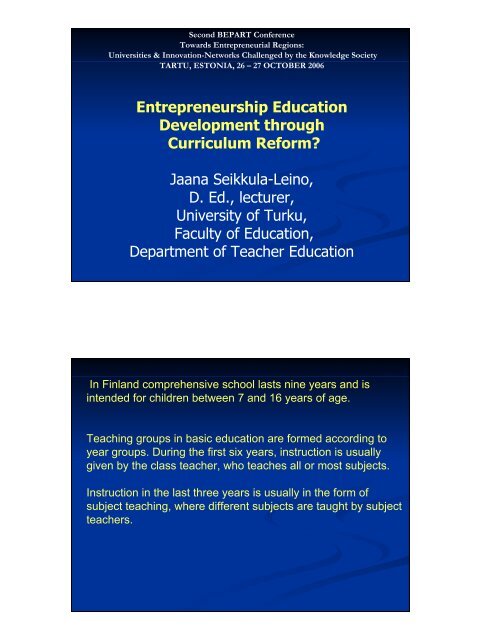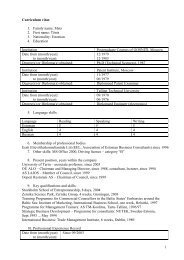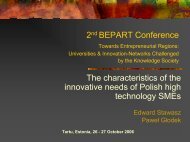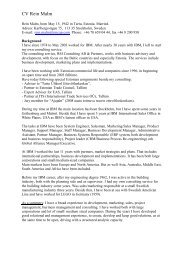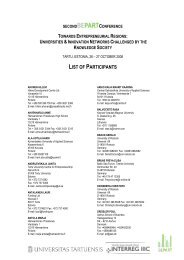Entrepreneurship Education Development through Curriculum ...
Entrepreneurship Education Development through Curriculum ...
Entrepreneurship Education Development through Curriculum ...
Create successful ePaper yourself
Turn your PDF publications into a flip-book with our unique Google optimized e-Paper software.
Second BEPART ConferenceTowards Entrepreneurial Regions:Universities & Innovation-Networks Challenged by the Knowledge SocietyTARTU, ESTONIA, 26 – 27 OCTOBER 2006<strong>Entrepreneurship</strong> <strong>Education</strong><strong>Development</strong> <strong>through</strong><strong>Curriculum</strong> Reform?Jaana Seikkula-Leino,D. Ed., lecturer,University of Turku,Faculty of <strong>Education</strong>,Department of Teacher <strong>Education</strong>In Finland comprehensive school lasts nine years and isintended for children between 7 and 16 years of age.Teaching groups in basic education are formed according toyear groups. During the first six years, instruction is usuallygiven by the class teacher, who teaches all or most subjects.Instruction in the last three years is usually in the form ofsubject teaching, where different subjects are taught by subjectteachers.
<strong>Entrepreneurship</strong> education will be officially part of theFinnish comprehensive school system, following the newcurriculum reform, which has started in 2004.<strong>Entrepreneurship</strong> education will be implemented as aninteractive theme: “Participatory Citizenship and<strong>Entrepreneurship</strong>” .In the comprehensive school level entrepreneurshipeducation is about enterprise, enterpreneurialism education– inner entrepreneurship instead of externalentrepreneurship.It will be integrated into the subjects locally and could also berealised <strong>through</strong> separate projects.The current curriculum reform in Finland is to a large extent basedon a so-called partnership model (see MacDonald 2003):Administrative bodies, curriculum reformers, trade organizations,researchers and parents all take part in the curriculum reformprocess.Requires co-operation - this idea of co-operation is also reflectedin the fact that there are some indications of a certain combinationof a centralized and decentralized model of curriculum reform thatis also actually being implemented.In other words, national administrative bodies, local instances ofeducational administration and teachers co-operate in thecurriculum reform to create a sensible whole.
Purpose of the study:The main aim was to find out how theentrepreneurship education is integratedinto the local curricula in this curriculumreform and what the processes behind thiswere.Attitudes towards entrepreneurshipeducation as well as resources andknowledge of the subject were also studied.Furthermore, the purpose was to analyze thecurriculum reform, which is the context for thedevelopment of entrepreneurship education.The subjects: teachers, principals, curriculumco-ordinators, directors of education andcultural services departments, tradesombudsmen and representatives of localentrepreneurs (N 478).The quantitative data collection, during thespring of 2005.43 medium-sized municipalities from differentparts of Finland
Attitudes towards entrepreneurship education are neitherpositive nor negative (scale 11 – 44, statistical average = 27.5, theaverage for all respondents = 27.6).With some individual statements regarding attitudes, even apositive tendency can be found, at least to some extent (forexample with the statement “<strong>Entrepreneurship</strong> educationpromotes the achievement of basic education goals andequality”).The attitudes towards entrepreneurship education are the mostnegative when it is considered in connection with the curriculumprocess.Teachers’ negative attitudes are also reflected by their reluctanceto participate in entrepreneurship education.Guidance counsellors, education directors or equivalent officeholders,head teachers and principals have the most positiveattitudes towards entrepreneurship education.They also have the most experience of participatingentrepreneurship education and they have the mostinformation on it.Teachers of grades 1-6 have the most negative attitudes. Thisis almost a statistically significant difference to educationofficers (p = 0.05).
The respondents feel that they do not have very muchknowledge about entrepreneurship education. (The average is2.2, scale 1 - 4).Teachers feel that entrepreneurship education has more to dowith the development of external entrepreneurship(approximately 45% of the teachers’ responses).The respondents feel that other required resources, such asfunding, education, materials, information, co-operationpartners, management support and developmental atmosphereare not sufficiently provided anywhere.Only 50% of the respondents had integrated themes intoindividual subjects – even though it is required by the NationalCore <strong>Curriculum</strong>.BUT: 30 % of school respondents are strengtheningentrepreneurship education during 2005-2006.percentage of respondents90807060504030201006057,8 56,343,86073,379,575 73,137,832 302420,815,95,4yesno1 2 3 4 5 6 7 8Estimate on wheather or not entrepreneurshipeducation will be implemented more during thenext 12 monhts1 = <strong>Education</strong> officers or equivalent office-holders2 = Headmasters and principals3 = <strong>Curriculum</strong> co-ordinators4 = Guidance counsellors5 = Teachers, grades 1-66 = Teachers, grades 7-97 = People in charge of municipalities’ industry and commerce issues8 = Representatives of entrepreneurs
IMPLICATIONS FOR PRACTICE IN THIS CURRENTCURRICULUM REFORM PROCESSI recommend that from now on, once the curricula ofentrepreneurship education is developed:We go back to this curriculum annually to consider thegoals, contents, realization and assessment of thiscurriculum from a pedagogical point of view – curriculum isa vivid, living document.This more pedagogical document could then be annexed tothe official administrative curriculum.In order to avoid an unnecessarily heavy burden, I think itwould be beneficial to focus on a few essential objectiveseach year (see also Blieck 2005, 185).IMPLICATIONS FOR PRACTICE - in order to developentrepreneurial education in the comprehensiveschool:Positive marketing and short information aboutentrepreneurial education – the concept is unclear…and then, teachers’ education development whereshould be more focus on enterprise education.In order to develop enterprising society the localentrepreneurial education plans should be integrated bothinto the municipalities’ economic life strategies and localcurricula.
6. METHODICALNESS1.Objectives2.Vision3.Strategy4.Structure5.AssessmentJaana Seikkula-Leino, D. Ed., University of Turku,jaana.seikkula-leino@utu.fi


